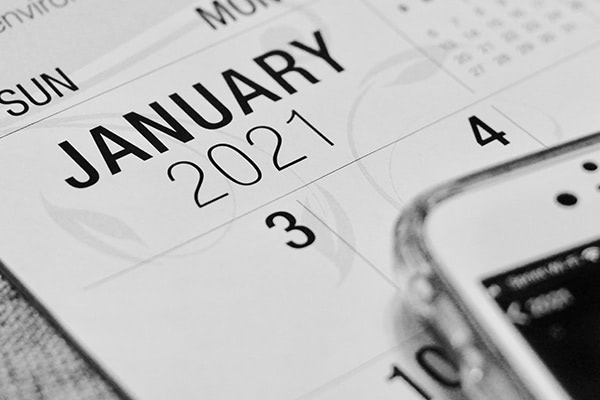Do realistic New Year’s resolutions exist? Or, more specifically, do realistic budgeting resolutions exist? Our resolutions always start off with the best intentions. They’re going to make us better and more equipped to take on life! As January slips into February, though, our resolutions often slip through the cracks until we abandon them completely. If budgeting is one of your resolutions this year, you don’t want to lose track of it.
Saving money is an important part of protecting your personal finances. Realistically, it should always be something we consider, but the start of a new year seems to trigger a fresh desire to keep spending in check. The issue is, many of us lack realistic budgeting resolutions. If you go big and vow to save an extra $1,000 each month, you’re more likely to fall short when you find this isn’t an easy goal.
With that in mind, consider these five realistic budgeting resolutions that will help you keep track of your savings in 2021.
Set up a savings account
Budgeting is a combination of spending less and saving more. One of the first steps you can take to achieve this is setting up a separate account, and adding small amounts of money to it regularly. Use this account as a place purely for saving, not spending. This way, you’ll have less extra money available to spend, and more set aside for your savings.
Start this realistic budgeting resolution by asking yourself, “How much extra money do I typically have to spend?” This will depend on your own income, monthly payments, and expenses on essentials. With that number, set aside a chosen percentage to keep safe in your new account. It doesn’t have to be big – even 10 per cent is worthwhile. You can add to this account weekly, bi-weekly, or monthly, and watch your savings grow. Eventually, you’ll have a nice amount of money saved up.
A tip to make this realistic budgeting resolution work: Don’t promise to add a huge amount of money to a savings account each month. You still need money to spend on life!
Prepare for unexpected expenses
Next, remember that life happens. You don’t want to have a strapped budget that doesn’t leave room for unexpected costs. No one plans for a surprise vet bill or a fender bender, but you don’t want to find yourself unable to pay those costs. Make a resolution not to anticipate everything you’ll need to spend money on – it’s impossible. Instead, start an emergency fund. This is a similar process to creating an account for future savings. Determine how much you can afford to put aside for emergencies, and decide how often you can contribute to it.
Cut your “extra” expenses
Do you tend to get takeout at least twice a week? Consider reducing it to once a week instead of cutting it out altogether. Suddenly quitting something you love never works out, and there’s no need to feel like you can’t indulge once in a while! Budgeting involves compromise. If your extra expenses can meet your budget in the middle, it’s a win-win for you. It doesn’t have to be takeout – coffee, movies, clothes shopping, and any other extra spending hobby will work.
This resolution will take some time to see the results. Most likely, you’ll just be saving small amounts of money at a time, so don’t give up! Saving $20 a week gives you over $1,000 after one year. Think about what non-essentials you spend the most money on, and work towards reducing the amount you spend on them.
Check in every month
Don’t set your goals and then forget to see what kind of progress you’re making on them. A super realistic budgeting resolution is to make a habit out of checking in with your spending each month. This one takes no big effort! Just browse through your expenses and compare them to previous months. Are you gradually seeing an increase in your savings? Your personalized budgeting plan is working! If you feel like you’re able, you can even aim for a slightly higher savings goal. Are you breaking even or, worse, actually spending more money than you used to? Then it’s time to reevaluate your plan, and see if you can tighten your spending habits.
Budgeting allows you to constantly reassess and readjust your spending and saving habits as needed. If you never check in with yourself, you won’t know how your budgeting is going. You don’t want to be in the dark with your money. If you take the time to set up a plan for yourself, take a moment to see how it’s working out for you.
Start small
Start small and slow with your budgeting. It’s not realistic to expect yourself to save thousands more dollars than you’re used to within a month. Good things come to those who wait, and this applies to budgeting too. This last realistic budgeting resolution is to begin with a small goal you know you can achieve. This means you can be sure the first phase of your plan is going to work. Give yourself something to feel good about, and be patient! Budgeting isn’t an overnight fix for money issues, and it takes time to see any major changes. If you set a lofty goal you can’t achieve, you’ll end up feeling frustrated and more likely to quit when it doesn’t work out.
Each budgeting plan is going to be different depending on the person. Instead of following the same specific goals as someone else, use these realistic budgeting resolutions to create your own unique plan.
Looking for more ways to increase your savings for a mortgage? Give me a call at (705) 333-4338 or get in touch with me here!
